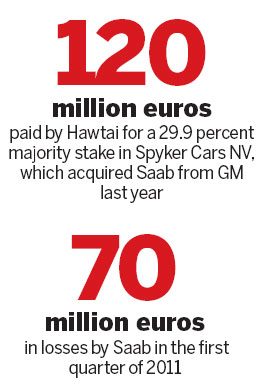Little-known Hawtai makes deal for Saab
With a planned investment of 150 million euros ($222 million) for a majority stake in Spyker Cars NV, little-known Chinese SUV and car manufacturer Hawtai Motor Group last week unveiled plans to make Saab cars in China.
The agreement calls for privately owned Hawtai to pay 120 million euros ($177.6 million) for a 29.9 percent stake in the Dutch sports car company and provide another 30 million euros ($44.4 million) in the form of convertible loans.

Second Swedish brand
If approved by banks and regulators, it would be the second time a Chinese automaker acquired rights to make a Swedish car brand following Geely Holding Group's acquisition of Volvo last year.
The transaction is subject to approval by the Chinese government as well as the European Investment Bank and the Swedish National Debt Office, Saab said in a statement.
After halting work last month because it could not pay suppliers, Saab has been seeking funds to resume production in Sweden.
Spyker bought the ailing company from US automaker General Motors last year, but reported net losses of more than 70 million euros ($103.6 million) in the first quarter of 2011.
Victor Muller, CEO of Spyker and chairman of Saab Automobile, said the company "secured the required mid-term financing" to continue in business as a result of its deal with Hawtai.
In addition to providing urgently needed funds, Saab said that the partnership with Hawtai could also help it make inroads into the booming Chinese market, where more than 13 million passenger cars were sold last year.
Only 33 cars last year
Only 33 Saab cars were sold in China last year, according to statistics from marketing information provider Gasgoo.com. Meanwhile, the company reported total global sales of only about 30,000 units.
Muller said Hawtai and Saab plan to produce cars in China in two years and sell them internationally.
"With Hawtai's clean diesel engine technologies and production capacity, and its ambitious development programs, we have found the right partner to develop the Saab business and build a solid relationship," he said.
Founded in 2000, Hawtai has its headquarters and R&D center in Beijing, with production facilities in Rongcheng, Shandong province, and Ordos, Inner Mongolia autonomous region.
The company's website says its combined yearly production capacity is 350,000 vehicles, 300,000 diesel engines and 450,000 automatic transmissions.
Yet it sold just 80,000 vehicles last year and began building sedans only six months ago.
Hawtai aims to expand its capacity to 1 million vehicles, 1 million engines and 1 million automatic transmissions annually by 2015, according to its website.
'Decades to build'
"The partnership with the iconic Saab brand will give us access to innovative technologies and an international network that would have taken us decades to build," said Zhang Ruijun, the company's vice-president.
He noted that Saab has the most advanced turbocharging technology in the world that will help improve Hawtai's know-how in diesel engines.
Concerns about strength
Yet some analysts voiced concern about prospects for the new venture because Hawtai is not itself a big, strong company and Saab is struggling near bankruptcy.
As well, Saab is a niche brand that won't have large volume sales, which also makes the deal risky for Hawtai, analysts said.
At the end of 2009, Beijing Automotive Industry Holding Corp (BAIC) bought rights to the 9-3 and 9-5 models and related engine and transmission technologies from Saab. It plans to build own-brand mid- and high-end cars based on the assets.
Industry insiders said if Hawtai and Saab build cars in China, it would be a blow to BAIC's own-brand vehicles.
But Muller denied there would be competition between the future joint venture's products and BAIC cars. He said that the company will be producing authentic Saab cars in China while BAIC only bought some of Saab's technologies.
 0
0 







Go to Forum >>0 Comments